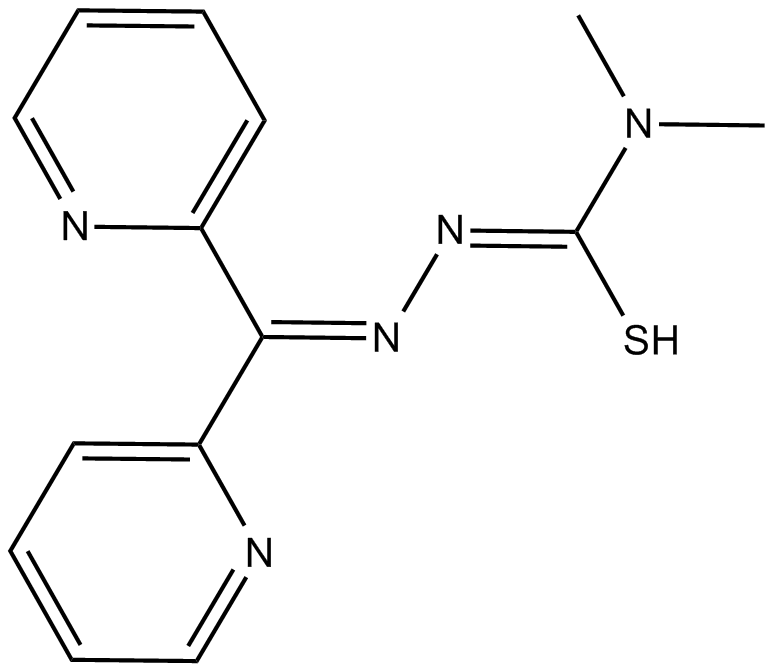Dp44mT |
| Katalog-Nr.GC15399 |
Dp44mT ist ein Eisenchelator mit selektiver AntikrebsaktivitÄt.
Products are for research use only. Not for human use. We do not sell to patients.

Cas No.: 152095-12-0
Sample solution is provided at 25 µL, 10mM.
Dp44mT is an iron chelator that selectively inhibit topoisomerase IIα, with an GI50 value of ~100 nmol/L in the human breast cancer cell line MDA-MB-231 [1].
Topoisomerases play important roles in chromosome segregation, DNA synthesis, and transcription. Topoisomerase I and topoisomerase II are two major types of topoisomerases in eukaryotes. Human cells contain two isozymes of topoisomerase II, named topo IIa and topo IIβ [2].
In control experiments, the Nalm-6 leukemic top2α+/- cells expressed ~57% as much levels of top2α enzyme as the wild type cells. Treated with Dp44mT at 100 nmol/L, compared with the top2α+/+ cells, top2α+/- cells showed partial resistance to the cytotoxic effects of the drug.After the exposure to Dp44mT at 100 nmol/L, the top2α+/+ cells showed 31.7%, while the top2α+/- cells only showed 9.4% sub-G1 containing cells. In HeLa cells, transient siRNA-mediated knockdown of top2α resulted in a reduction of ~78% in the protein level for top2α. In top2α siRNA cells, a partial resistance to Dp44mT (0.1 and 0.3 µmol/L) was found at 72 hours, compared with the control siRNA-treated cells [1].
In vivo, 6 and 24 hours after the treatment with 0.1 and 1 µmol/L of Dp44mT, the treatment resulted in the covalent complex formation between DNA and top2α. No complex formation was found after the treatment when probed for top1 or top2β. Caspase inhibitor pretreatment did not rescue the formation of top2α complex, so the formed top2α-DNA complexes were not the secondary effect of apoptosis [1].
References:
[1]. Rao VA, Klein SR, Agama KK, et al. The iron chelator Dp44mT causes DNA damage and selective inhibition of topoisomerase IIα in breast cancer cells. Cancer research, 2009, 69(3): 948-957.
[2]. Tan KB, Dorman TE, Falls KM, et al. Topoisomerase IIα and topoisomerase IIβ genes: characterization and mapping to human chromosomes 17 and 3, respectively. Cancer Research, 1992, 52(1): 231-234.
Average Rating: 5 (Based on Reviews and 8 reference(s) in Google Scholar.)
GLPBIO products are for RESEARCH USE ONLY. Please make sure your review or question is research based.
Required fields are marked with *




















